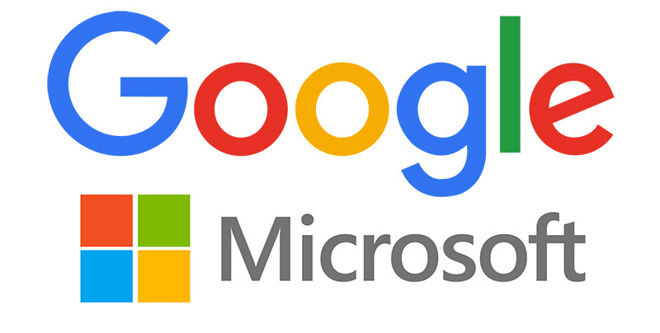Google v Microsoft: who will win the AI chatbot race?

The James Webb space telescope cost $10bn (£8.3bn) to build, but it left Google nursing losses of more than $160bn after the search engine’s new chatbot answered a question about it incorrectly.
Google and Microsoft both announced plans for AI-enhanced search this week, taking the artificial intelligence space race into a new phase. However, the launch of the former’s new chatbot, Bard, misfired badly when the error appeared in a demo.
The competitor to the Microsoft-backed ChatGPT was asked about the telescope and one of the answers displayed said it “took the very first pictures of a planet outside of our own solar system”. Experts were quick to notice the inaccuracy – as were investors.
Shares in Alphabet, Google’s parent, lost $163bn in value over Wednesday and Thursday. The company remains a $1tn-plus behemoth, in large part because of its dominance in search. But for how long?
Microsoft announced on Tuesday that it was using the technology behind ChatGPT, developed by the San Francisco-based company OpenAI, to enhance its Bing search engine and Edge web browser.
The company, which announced a multibillion-dollar investment in OpenAI last month, said the technology, based on a more powerful version of ChatGPT, would help users refine queries more easily, give more relevant, up-to-date results and make shopping easier. It said the new-look Bing would be publicly available in several weeks’ time, and users can also join a waiting list for early access.
Google knew it had to respond after the OpenAI deal and the runaway success of ChatGPT. It said on Monday that Bard was undergoing specialist testing and would be made more widely available to the public in the coming weeks.
Sundar Pichai, Google’s CEO, said the technology behind Bard would soon be integrated into its search engine, citing the example of asking a new-look Google whether the piano or guitar is easier to learn. Unfortunately, it was the telescope response that got the most attention, combined with an underwhelming presentation on Google’s latest AI-powered search plans in Paris on Wednesday.
Dan Ives, an analyst at US financial services firm Wedbush Securities, said the week had been a “massive success story” for Microsoft’s CEO, Satya Nadella, but that Google’s Paris event and Bard stumble had left the company with “more questions than answers”.
However, he added: “While initially it feels like Google rushed Bard to market with the Microsoft ChatGPT deal and event overshadowing the company, this race will be a long one.”
Microsoft is also unlikely to emerge unscathed from James Webb-type mistakes, experts said. Indeed, ChatGPT users have encountered inaccuracies while using the chatbot, the technology of which is underpinning the new-look Bing and other Microsoft products such as Teams.
Experts have warned that large language models, which are the basis for Bard and ChatGPT, are prone to errors because of the way they are built. These models are fed datasets comprising billions of words that train the AI to generate plausible-sounding responses to queries. Operating in a way akin to predictive text, they build a model to predict the likeliest word or sentence to come after the user’s prompt.
“ChatGPT is a phrase predictor,” says Dr Andrew Rogoyski of the Institute for People-Centred AI at the University of Surrey. “It’s a system that has memorised a billion books so that it can guess what comes after the question you ask it. Everything it says is essentially a rehash of something that has been said before, by a human. It’s not remotely intelligent. There are much smarter, and more useful, AI systems operating robots, diagnosing disease, or steering a car.”
However, the phenomenal interest in ChatGPT, which signed up more than 100 million users in two months, shows considerable public appetite for an AI-enhanced search experience. Fans of the chatbot have praised its ability to summarise documents, tidy up prose and write code (among many other things), while journalists given early glimpses of the new AI-powered Bing have been impressed.
In one instance, it offers more nuanced responses than ChatGPT to questions such as: “Why did Russia start a war in Ukraine?” According to the Platformer newsletter, the new-look Bing also gives users the options of responding in certain tones – professional, casual, enthusiastic, informational or funny – and in different formats, including paragraph, email or blog.
The FAQ page on the new-look Bing is also upfront about potential errors, stating: “AI can make mistakes,” and: “You may see responses that sound convincing but are incomplete, inaccurate, or inappropriate.”
Google said the telescope error underlined the need for the “rigorous testing” that Bard is undergoing, before a wider release to the public.
But if public interest in chatbot-enhanced search, as shown by the success of ChatGPT, is maintained, then Microsoft has a big target to aim at. Google dominates the global search market with a share of 91%, according to the internet data firm SimilarWeb, with Bing at just 3%. The Chinese search engine Baidu has also put its own chatbot into the race, called “Ernie bot”.
According to Microsoft, every percentage point gained in market share – presumably from Google – represents an extra $2bn in advertising revenue for the company, referring to the lucrative business of ads placed in search results. This week Microsoft said Bing’s AI-boosted ability to understand queries with “greater depth” and gain insights into users with “deep conversational engagement” would be a draw for advertisers. Google obviously agrees.
There is a big gap to bridge between the companies: in its most recent quarterly results, Microsoft posted revenues of $3.2bn from search and news advertising, while Google generated $42.6bn in search revenues. Chatbots also require a lot of processing power, so there are also cost implications for any AI-powered market grab, as well as defending a market-leading position.
Google has invested heavily in AI and its use is everywhere in its products (in Google Translate, for instance). Alphabet also owns the UK-based DeepMind, a leading AI research firm. Google remains in a strong position.
“I do not believe the new version of Bing leveraging large language model technology will turn out to be a serious threat to Google’s search business. Google has large language model technology that is at least on par with that from Microsoft and OpenAI,” says Mark Riedl, a professor at the Georgia Institute of Technology.
However, he adds: “Microsoft has pulled off a major feat by virtually overnight making search technology a two-way race again. It will be interesting to see how things play out.”
… we have a small favour to ask. Tens of millions have placed their trust in the Guardian’s fearless journalism since we started publishing 200 years ago, turning to us in moments of crisis, uncertainty, solidarity and hope. More than 1.5 million supporters, from 180 countries, now power us financially – keeping us open to all, and fiercely independent. Will you make a difference and support us too?
Unlike many others, the Guardian has no shareholders and no billionaire owner. Just the determination and passion to deliver high-impact global reporting, always free from commercial or political influence. Reporting like this is vital for democracy, for fairness and to demand better from the powerful.
And we provide all this for free, for everyone to read. We do this because we believe in information equality. Greater numbers of people can keep track of the global events shaping our world, understand their impact on people and communities, and become inspired to take meaningful action. Millions can benefit from open access to quality, truthful news, regardless of their ability to pay for it.


